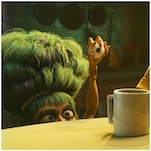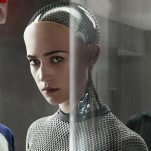Union Square

A reunion of sisters leads to simmering tension, shocking revelations and cathartic healing and understanding of a pat sort in Union Square, a small-scale drama set largely in an apartment in Manhattan’s titular neighborhood. Nancy Savoca’s film wears its indie-ness on its sleeve, relegating itself to one primary location and a number of sequences shot on the streets of New York, a low-budget construction that concentrates squarely on the story’s two protagonists, Lucy (Mira Sorvino) and Jenny (Tammy Blanchard). Lucy is in town to meet up with a boyfriend, a plan that—involving going shopping for leopard-print dresses to impress her beau—is quickly negated by the guy’s cell-phone excuses about being busy at work. Furious and stuck in the city with nothing to do, Lucy drops in on Jenny, who runs a health food business with her husband, Bill (Mike Doyle), out of their Union Square apartment, and who hasn’t seen Lucy for three years. The reasons behind this split are, at least initially, left vague by Savoca and Mary Tobler’s script, allowing minor mystery to build as the pushy Lucy imposes on her demure—and clearly unhappy-about-this-surprise—sibling, barging into her home and, without permission, setting up temporary residence.
-

-

-

-

-

-

-

-

-

-

-

-

-

-

-

-

-

-

-

-

-

-

-

-

-

-

-

-

-

-

-

-

-

-

-

-

-

-

-

-








































